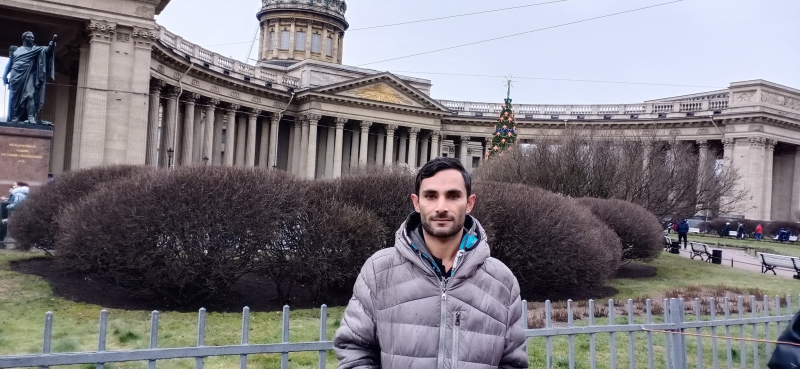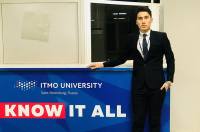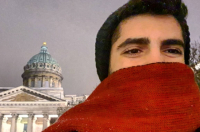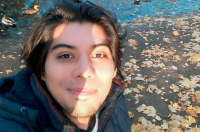What motivated you to choose Information Security as your field of studies?
Digital technologies are growing rapidly, and the safety and security of these technologies is the primary pillar. That’s why I chose this field to contribute to the world in this growing digital age.
What do you like most about information security?
I would like to answer with the same lines I mentioned in my final thesis defense: “Today there are nearly 20 billion devices connected to the internet, and there will be 50 billion by 2030. Cybercrime will cost the world $6 trillion by 2021.” Massive amounts of data are collected, shared, and stored. Every organization and business becomes vulnerable. I love solving puzzles, problems, and enjoy a good challenge.
How important do you think this field is and how can we see it developing in the future?
Well, this is a big question. Here I would like to quote Ryan Webber, Vice President of Enterprise Mobility at SOTI: “The future of cybersecurity will center around industry adoption of 5G networks. 5G technology will enable billions of new devices to be connected to the internet – with more speed, density, and efficiency than ever seen before. Therefore, 5G will result in a rise in cybersecurity concerns as hackers are provided greater access to entire networks of connected ‘Things' – from remote sensors to self-driving cars and smart devices in supply chains worldwide.”
What are the most valuable things you have learned in these two years?
I’ve learned a lot of new things in the two years of the program – communication skills, public speaking, negotiation skills, blog writing, the art of thinking, Russian language, and a lot more.
What do people often tell you when they learn where you’re from?
When people ask me where are you from and I reply I am from Pakistan, people suddenly react, “Ohh! You are from Pakistan, a beautiful land, loving and hospitable people”. Once, I was leaving the Lomonosova campus and I heard a voice calling me. I turned around and there was a student who was in one of my past courses. He said, “I may come to your country, please give me your contact.” I said, “It's my pleasure.”
Can you tell us a bit about your hometown?
My hometown is a small town named Badin, which is located east of the Indus River and near the sea coast. There is fertile land around the city where people cultivate rice, cotton, sugarcane, sunflower, and vegetables. Thar Desert, one of the biggest deserts in the world, is located only 100km away from my hometown, and it is especially popular in the rain season. The biggest city of Pakistan and the seventh biggest in the world, Karachi, is just a three-four-hour drive from my hometown. There are beautiful lakes, the Indus river, the seashore, and mountains just a short distance away from Badin. People are very kind, trustworthy, caring, loving, and hospitable. Almost all people live with joint families. If a person does not live in a joint family, their parents’ house will be very close to them. It's common for the people in my town to meet and get to know each other over tea. The first thing you get offered is tea (it’s important to have milk in your tea). We call it “chai”, a common word in Russian and Urdu language. Everyone drinks at least two cups of tea a day, one for breakfast and another in the evening.
What was your thought process before deciding to come to Russia? Did you have some fears or dreams?
I did not have any fears, but of course, it was a dream, the dream of a Master's degree, the dream of my life, the dream of paying back to society in any shape, whether through my field of studies or with the help and guidance of someone. I also write articles for ITMO.Blogs that are helpful for new international students.
What surprised you about ITMO?
I was not expecting this kind of management, they are really careful and cooperative. ITMO University is more than a university.
Why ITMO University?
This is an interesting question. I was the winner of the Open Doors scholarship competition and I could choose any university in Russia, and I settled on one of the best universities, ITMO University. The first impression as an international student is ITMO’s International Office and their outstanding staff, cooperative beyond expectations, and fast communicators. Other than this, my Information Security department is also amazing. The professors are nice. Another advantage of ITMO is that the courses are in English and professors and students have a good level of English.
What do you think makes a good student?
A good student is committed, has valuable communication skills, is punctual and serves as a guide to his group mates.
Do you have any favorite places in St. Petersburg?
Of course, it's my favorite city! Some of the places that I like are Mayakovsky Library, Neva River, and Nevsky Prospekt.
What is an interesting fact about you?
Well, I like traveling, talking with strangers, reading books, listening to music, and if I say I don’t use Instagram and Snapchat, you might think it's funny, but it’s true.
What piece of art (book, music, movie, etc.) most influenced the person you are today?
Some writers have impressed me with their ideas, their books are not just books but an entire philosophy. Among them are Javed Chaudhry and Khan Asif (Urdu Writer), and Robert T. Kiyosaki (English Writer). I participated in a Book Review Competition at the British Book Center, Saint Petersburg. I wrote a review on Cash Flow Quadrant by Robert T. Kiyosaki, and I was the only winner among the Non-Fiction book reviewers.
What is a fact that you've just learned and would like to share with everyone else?
I have a message for the newcomers. If you want to adjust quickly to St. Petersburg, ITMO.blogs will be very helpful for you. They will teach you about everything – tourist places, foods, theaters, libraries, education opportunities, festivals, and so on.
Written by Ethan Avila



